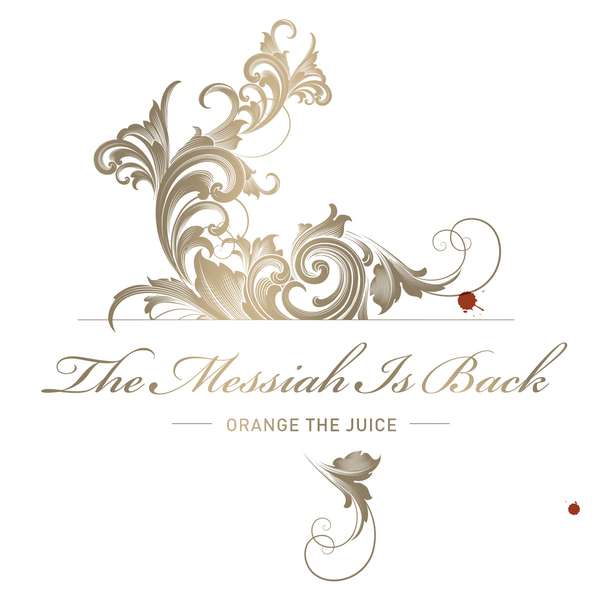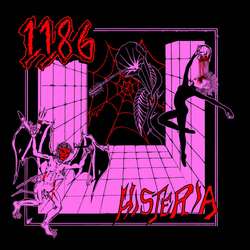With a hard copy release that’s designed to look like a blood-spattered wedding invitation, The Messiah is Back has to be one of the most excitingly eclectic and boundlessly imaginative albums that came out in 2014 – or any year for that matter. Produced by Polish group Orange the Juice which, with its seven player lineup more resembles a jazz outfit than what most people would think of as a rock band, Messiah unleashes a variety of sounds that would put most so-called progressive rock albums to shame, its tone and mood varying wildly from song-to-song and even within individual tracks. This almost leaves the listeners with the sensation of being tossed around in a blender that’s mixing up genres and musical styles with reckless abandon, and though that might not sound altogether alluring, the skill with which Orange the Juice tackle the album makes it a blast to experience.
Providing an antidote for an overload of predictable and/or boring music, The Messiah is Back starts with a track entitled “Romanian Beach” which has a lazy main section of easy listening funk replete with wah guitar, super-smooth bass, and trumpet accents. Shuffling through numerous rhythmic change-ups, the piece occasionally works in frenetic outbursts of noise rock and demented laughter which suggests that the otherwise harmless composition has been overtaken by demons. The alternation between relaxed and anarchic moments noticeable in this opener continues throughout much of the rest of the album and could probably be considered one of the primary elements of Orange the Juice’s music. The quiet and delicate theme which kicks off “Summer Sea” for instance, is interrupted by cackling, heavily distorted vocals of the sort heard in Lightning Bolt. As this second track continues, it transitions through a section of churning, grinding electro, a woozy but somewhat unsettling waltz seemingly lifted from the Lucifer Rising Soundtrack, and a final brass band “oompah” section that recalls the music of Beirut. All the while, Konrad Zawadzki interjects downright bizarre vocalizations, ranging from hiccup sounds to African vocal clicks to agonized, whispered spoken word.
Following a brief saxophone solo, a downtempo, trance-inducing groove bubbles up in third track “The Message” and continues for the majority of the piece. Around the three-quarter mark however, the musicians make a sudden transition into alt-rock, with harsh, screamed vocals and a thrashing rhythm established in the guitar and bass. A fantasy vibe oozes through the ten-minute “Report” which finds Zawadzki barking out public service announcement exclamations when a listener isn’t focused on clanking sci-fi sound effects or a moody duet of guitar and sax. Though possibly my least favorite track here since it seems a bit gimmicky, the piece culminates in a driving section of discordant guitar, hammering rhythms, and occasional theremin that leads into a spacey finale punctuated by burpy instrumental accents. A childrens vocal choir is accompanied by droning and gurgling sound effects on the brief “A Body Without a Head,” and the composition and lyrics of penultimate track “Blame” reflect an individual dealing with the consequences of a regrettable action.
The album closes with twenty-one minute “I Was Wrong,” a juggernaut of a track that first introduces cacophonous noise which bridges into another soft rock jam highlighted by a duet of trumpet and saxophone with soulful female vocals and wah guitar punctuation. Following a much louder, slow-building section that has more in common with heavy metal than R&B, the track dissolves into silence before reinventing itself as an extended, heavy and hypnotic free jazz number. If one joined The Messiah is Back midway through this final track without knowing what was playing, it might come as a surprise given the lonely trumpet blasts, Herbie Hancock-like keyboard tinkles, and grunting, shadowy bass, that this wasn’t a Lalo Schifrin soundtrack from the 1970s or Miles Davis’s weirdo Agharta, but the addition of helicopter-like background noise puts it in a league all its own. Though some might find this piece unexciting due its extreme length, I dug the smoky and mysterious atmosphere as well as the assured performances.
When all was said and done, I was impressed with the execution of this album as a whole: many modern prog rock albums seem more like glorified solo efforts (Modest Midget’s 2014 Crysis certainly fits that description), but The Messiah is Back is a collaborative effort of the most astounding variety. Capable of playing just about any type of music they want to, with this sophomore album (the group’s first in six years), Orange the Juice have proven themselves as one of the most genuinely inventive and proficient bands playing today, and it’s sincerely unfortunate that they haven’t gotten more recognition from the mainstream music press. Still, it’s always invigorating to stumble upon a relatively unknown group doing amazing things, and though the vocals throughout the album seem a bit corny, I’d urge anyone interested in imaginative, well-performed music to give this a listen as soon as possible.




